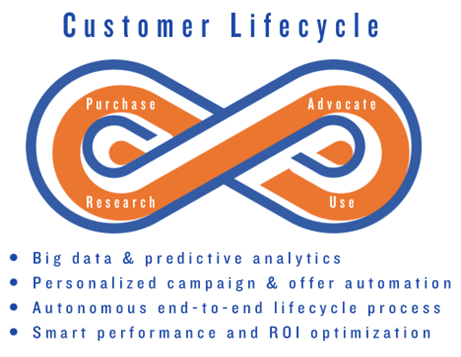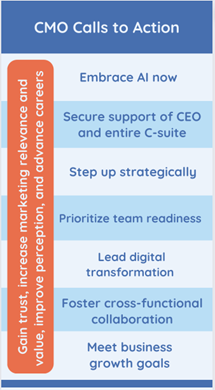Artificial intelligence gives CMOs a unique, career-changing opportunity to increase their strategic value and impact on business. But CMOs must act now to take marketing results to the next level.
With the support of the CEO and C-suite, CMOs can use AI responsibly to drive digital change and meet growth goals.
And it's not just about business; it's about positively affecting humanity.
Beyond Tactics: CMOs as Growth Leaders in the Age of AI
Although key to customer-focused strategies and market positioning, CMOs face a perception problem. They're often seen as tactical, not strategic, influencers. Surveys show a big gap between how CMOs see their role and CEO expectations.
The result? Short CMO tenure and lower marketing budgets.
But things are changing. Although CEOs may be underwhelmed, almost half say they recognize CMOs' role in driving growth. And more than 8 out of 10 CEOs say they see the CMOs' potential impact.
Using AI in marketing could bring $1.4 to $2.6 trillion in business value. It's a goldmine for proactive CMOs to lead the charge in AI adoption.
Six Use Cases for AI in Marketing
As a CMO, I can confirm that tapping into AI opens up new strategies and efficiencies. Many martech and productivity apps provide a solid foundation. Tech partners such as 6Sense, Adobe, Asana, Google, HubSpot, OpenAI, Salesforce, Zoom, and others now offer AI capabilities. The path forward is clear.
First, CMOs should collaborate with current partners to explore possibilities, pilot use cases, and discuss key AI aspects, including security, privacy, and ethics. The intent is to enable reliable, responsible AI adoption.
The following six use cases of AI are among the most compelling and strategic for CMOs.
1. Developing Insight-Driven Strategies
AI-powered market insights allow the CMO and team to gather and analyze lots of market and customer data.
AI algorithms and analytics find patterns and trends to get unique insights for strategic choices on...
- Top target segments and use cases
- Defensible positioning and differentiation
- Pricing and packaging strategy
- Product road map suggestions
- Targeted go-to-market strategy
For example, GPT-4 Advanced Data Analysis can evaluate potential target segments on various criteria, such as market size, growth, win rate, competitive intensity, and partner strength. It can output a heatmap showing segment strengths, both by criterion and overall. Such data-driven analysis drives cross-functional discussions and alignment on which top segments to prioritize.
Fully 77% of marketers want AI to cut the time it takes to do repetitive tasks. Although that extra time enables more strategic work, AI also excels when applied to strategic tasks and gaining deep customer insights, raising the importance and value of marketers.
In particular, knowing customers well is critical to delivering personalized experiences.
2. Delivering Personalized Experiences
Fast-growing companies drive 40% more of their revenue from personalization, and 77% of consumers expect personalization. AI can revolutionize marketing through personalized campaigns that include customized emails, website experience, landing pages, and smart chat by using customer data, such as role, online behavior, and past purchases.
AI can improve the entire customer journey, letting customers easily get what they want. AI can handle complex back-end tasks.
In travel, AI could suggest personalized itineraries and automatically handle booking details, such as flights, hotels, cars, and events. For project management software, AI could recommend suitable options based on needs, team size, industry, features, and budget. AI streamlines and automates the process from onboarding to workflow improvements and 24/7 chatbot support.
3. Overcoming Online Search Challenges
Search traffic is forecast to drop = up to 25% as a consequence of Google's AI algorithm that allows users to get answers to search queries all in one click. That reduces the need for someone to click on SERP links to various websites.
AI tools with Web browsing capabilities like those of ChatGPT affect search traffic in the same way. Also, cost per click may increase as a result of more competition for less ad space.
To make every click count, marketers can use AI to better target audiences, find new places online to reach people, and create helpful answers to search questions that even Google can't ignore.
4. Accelerating Customer Conversion
Intent data from site visits and searches offers insights into a customer's journey from research to purchase. AI uses it to automatically deliver relevant, personalized content and offers for each journey stage. It also predicts likely buyers, helping Sales and Marketing target the most promising leads.
AI can schedule demos, simplify proposals, and boost conversions and growth.

AI can further drive conversions by identifying upsell or cross-sell opportunities based on past purchases, app use, and browsing behavior.
In e-commerce, AI could optimize page layouts or personalize ads to maximize conversions.
5. Reducing Customer Churn
Unlike old methods, AI can quickly analyze vast amounts of customer data, such as usage, buying habits, download volume, timing and frequency of communications, and level of engagement. By rapidly spotting early dissatisfaction signs, marketers can proactively retain valuable customers via special campaigns, deals, helpful tips within the app, or personalized white-glove service.
AI can initiate the right unique response for individual customers and continue optimizing until their behavior shows lower churn risk. That boosts retention and reduces the need to replace lost revenue from churn.
6. Optimizing Growth and ROI
AI improves campaign performance and ROI by optimizing spend. It analyzes past campaigns to allocate budget for the best future return.
AI also increases efficiency by automating various tasks, such as data analysis and audience segmentation, saving time and cost.
In e-commerce, AI can adjust prices based on demand and preferences to maximize profits. Similarly, in finance, it can find profitable investment strategies in large data sets.
Such AI-driven growth drives business efficiency and profitability higher.
Strategic AI Leadership: The Way Forward for CMOs

Sam Altman, former CEO of OpenAI, introduced Moore's Law for Everything, suggesting that the world's intelligence will double every 18 months.
Embracing AI now will allow CMOs to overcome outdated perceptions and solidify their role as strategic growth drivers. They can spearhead digital change in their organizations and foster greater collaboration across departments. CMOs can lead companywide AI ethics, privacy, security, and responsibility initiatives.
By promoting responsible AI, CMOs can promote the customer view. That ensures AI's impact goes beyond business gains to benefit humanity.
To prepare teams for the future, CMOs must prioritize skill-building and training. They should also create modern AI roles, such as Head of Generative AI and AI Ethics Specialist. As some roles require fewer staff, the focus should be on modernizing teams and using AI for growth.
Just as vital is to get full support from the CEO and executives. With leadership backing and a collaborative culture, CMOs can spark a customer-focused revolution that drives unmatched growth.
Now is the time for CMOs to step up as strategic leaders. By fully adopting AI, CMOs can increase their strategic value and maximize Marketing's business impact.
* * *
AI presents an opportunity for CMOs to shape the future, but they must seize it with vision and purposeful action.
The risk of not acting is missing a strategic leadership chance; the reward is unquestionable growth and influence.
More Resources on AI Use Cases and the CMO Role
Marketing at the Speed of Thought: AI Use Cases for Four Content Types
The Power of AI in B2B Marketing and Communications | Marketing Smarts Live Show




